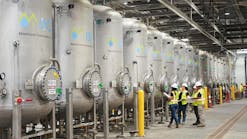UNITED ARAB EMIRATES, Jan. 7, 2013 -- Countries in the Middle East and North Africa (MENA) rely heavily on imports to meet at least 50 percent of their food requirements.
Post 2008, dependence on food imports had made the region more vulnerable to international food price hikes. Therefore, the MENA countries had to undertake measures such as subsidies and price control to provide basic supplies. This made the Governments in the region review food security in terms of food sovereignty, which translates to meeting demand from domestic sources as far as possible. Being the most water-stressed region in the world, the food security issue has become even more pertinent.
Globally, the food and beverage industry's focus on health and wellness is increasing, alongside smart and green production. This is expected to result in re-assessment of safe solutions while promoting process efficiencies. Taking a cue from the global food and beverage industry, the trend of water reuse practices will accelerate development and ascertain improvement in water recycling technologies in the MENA.
According to Frost & Sullivan, high organic content in wastewater and overall water scarcity has further emphasised the need to adopt innovation and technological upgrades in wastewater treatment, in order to enhance water management in the MENA. Many companies in the region, including National Food Industries Company (NFIC, Saudi Arabia), are already emulating best practices for water recycling and reuse, thereby reducing their water intake significantly. With food security high on agenda, such practices are expected to become a norm in coming years.
"Proliferation in the food and beverage industries inclusive of production units for juice, dairy products, oil processing, canned fruits, and vegetables, has led to implementation of sustainable water management practices. Within the MENA, the Kingdom of Saudi Arabia, Egypt, Qatar, and the UAE are experiencing significant growth in the food industry, including meat production; thereby opening up huge opportunities for water technology companies," Kshitij Nilkanth, Program Manager, Environment and Building Technologies Practice, Frost & Sullivan.
Frost & Sullivan forecasts rapid growth for the MENA water and wastewater treatment market in the food and beverage industry. This will further result in industrial customers approaching water specialists to improve operational efficiency and successfully meet stricter environmental standards. In addition, food and beverage manufacturing corporations are expected to take up water conservation as a priority, by setting clear targets and improving water use ratios and wastewater discharge levels.
###


